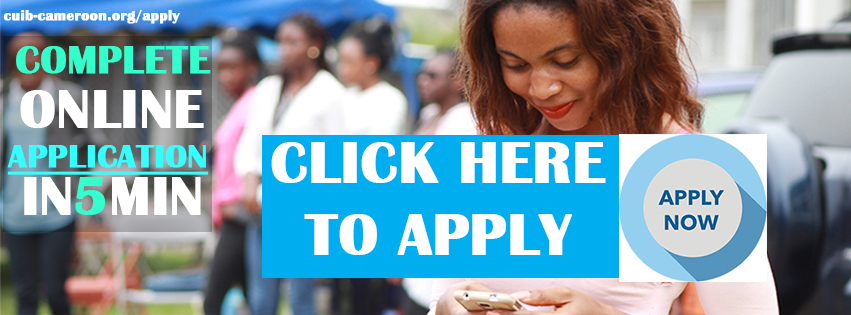
The academic programmes are designed to prepare students to be able to fit in a dynamic, complex, expanding and constantly changing profession. The programmes also takes into consideration the 21st century global economy which is increasingly sophisticated and interdependent
- BSc in Management
- BSc in Accountancy
- (Bsc.) in R M and E R
- (Bsc.) in and Risk M
- (Bsc.) in B and F
- Bachelor of Science in Marketing
“…..Management is all and all”. This phrase by an ardent scholar in the field, Peter F. Drucker reflects the holistic approach to management scholarship embraced by CUIB and epitomized by the B. Sc. Management programme. The programme is built on the manifested need of the professional business world for skilful but versatile manpower capable of operating within ad-hoc and fixed teams to customize products and services to satisfy the increasingly exigent customers.
One of the most difficult equations facing practicing business managers in Cameroon and beyond is to shed off individualistic and self-serving tendencies of employees and build synergy for the corporate good. This apparently new problem is however just a reflection of egocentric business programmes that have been inspired by the quest for specialisation as projected by the coated failure of capitalism. The unavoidable end of such thinking is the existence of standalone specialised groups of employees (silos) who breed sub optimality at the expense of overall company good.
The ideology of the management programme breaks this chain towards self-destructive specialisation which inhibits professional flexibility by adopting an integrated approach with both compulsory and elective courses in the programme that cut across the entire spectrum of any 21st century world class business curriculum. Like any other programme in the School, the Management programme leverages on the mission of CUIB “…to produce professional servant managers with moral and spiritual values”. Far from being just a verbalised mantra, this is captured in the course structure with entrepreneurship and other personal development courses which span the entire eight (8) semesters of the programme.
OBJECTIVES OF THE PROGRAMME
As any foundation programme, the Management programme has three principal objectives:
- To provide a firm foundation for post-graduate specialisation in the following areas which leverage on management background:
- M.Sc. /MBA in Purchasing and Supplies Management
- M.Sc./MBA in Operations/Production Management
- M.Sc./MBA in Logistics Management
- M.Sc./MBA in Financial Management
- M.Sc./MBA in Project Management
- M.Sc./MBA in Human Resource Management
- M.Sc./MBA in Marketing Management
- M.Sc./MBA in Sales Management
- M.Sc. Management information Systems
To prepare the students professionally for the following entry and mid-level jobs:
- Project coordinators
- Inventory managers
- Management controllers
- Production managers
- Factory managers
- Human resource managers
- Loan managers
- Logistics managers
- Procurement managers
- Community relation specialists
- Management consultants
- Junior/branch managers
- Financial Managers
PHILOSOPHY OF THE PROGRAMME
The philosophy of the Accounting Programme is based on the predicament that academic and professional excellence is fundamental for any student to succeed in today’s environment. The academic programmes are designed to prepare students to be able to fit in a dynamic, complex, expanding and constantly changing accounting profession. The programme also takes into consideration the 21st century global economy which is increasingly sophisticated and interdependent. This is why in the School of Management Sciences, students start specialisation only in the fourth semester. The first three semesters are used to lay an interdependent broad base.
OBJECTIVE OF THE PROGRAMME
The Department of Accountancy is embarked on training students to acquire managerial business decision-making skills that are relevant in the 21st century business world. In this respect, the curriculum is focused on both academic and industrial training. The academic component covers courses in Accounting, Finance, management, marketing and entrepreneurial studies. In the professional arm, students are required to do at least six months of industrial training before being eligible for graduation.
To create and operate in an environment that will help students pick up both academic and moral knowledge.
To have students understand the background, theory and practice of human resource management and its system.
Develop students understanding, critical thinking, analysis and synthesis of people management related data using methods and technologies.
Produce an atmosphere where students can explore their creativity, work in teams as much as individually so as to enable them to have the desired behaviour and pick up values that will make them fit to sustain their careers.
Developing the knowledge, skills and values of the discipline
Knowing and conforming to the ethics of the profession
Maintaining a high level of integrity, objectivity, competence, and concern for public interest
PHILOSOPHY OF THE PROGRAM
Though its existence can be dated from the period of Industrial Revolution, the nomenclature (Human Resource Management was ascribed to the fields only in the 1980s with major contributions such as, enhancement of human performance, change management and keeping the employer on the right side of the law (The Association of Business Executives 2011).
There is less interest in finding a universal paradigm or model for HRM that in understanding how it operates in diverse situations and what contributions it can make to the effectiveness and profitability of that organisation. No asset is perhaps more important to a nation than its human resources. It is the unique factor that makes the difference between an organisation, a community, a nation and others. Indeed, it is the human resources of a nation and not its capital nor material resources that ultimately determine the character and pace of its social and economic development (Todare1981). In effect, HRM is the creation, development and maintenance of an effective work force matching the requirements of the organisation and responding to the environment. It is the effective management of people at work, which examines what can and should be done to make workers more productive and satisfied.
The Philosophy of the Human Resource Programme is to graduate students with a broad base knowledge of the field including; theory, principle and practice, who will /with moral and spiritual values be apt to impact not only organisations in their immediate communities but those in the world at large.
OBJECTIVES OF THE PROGRAM,
The overall objective of the Human Resource Programme is to graduate students with an attitude of continuous learning, students who understand and can flexibly respond to change in circumstances in respect to human capital management so that they may be able to adapt and contribute to the organisation/business in which they find themselves. Specific objectives thereof are:
-
- To create and operate in an environment that will help students pick up both academic and moral knowledge.
- To have students understand the background, theory and practice of human resource management and its systems.
- Develop students understanding, critical thinking, analysis and synthesis of people management related data using methods and technologies.
- Produce an atmosphere where students can explore their creativity, to work as teams as much as individuals to enable them have the desired behaviour and pick up values that will make them fit to sustain their careers.
- Present a critical appraisal of current ideas concerning the future of employment systems and their implications. For HRM.
- To demonstrate how national business and employment systems are likely to affect the overall nature of HRM in different countries and multinational companies.
PHILOSOPHY OF THE PROGRAMME
The world is becoming more and more business oriented as demonstrated by the multiplicity of large and small size businesses. These businesses acquire and use new technologies which are very much open to varied categories of risks, a phenomenon which is almost unavoidable. Management of risk is now a key issue for all major businesses. Risk takes many forms: fluctuations in currencies, interest rates and commodity prices; threats to physical assets from earthquake, windstorm and other natural perils; man-made threats of terrorism, fraud and criminality. These are in addition to the host of operational and financial risks that surround all commercial enterprises.
The Insurance and Risk Management program of CUIB exemplifies the neighbourhood concept which entails being one another’s keeper (sharing in the grief and joy of others) as it provides guarantee for restoration in times of loss. This is strongly inbuilt in the EoC paradigm that insists on the need to put the human person at the centre of economic activity before profit.
Premising from the above concepts, the B.Sc. Insurance and Risk Management programme a well- established course that explores the multi-faceted world of risk management and reflects the growing interplay between insurance, risk management and financial services. The programme combines a practical approach with sound theory to create a learning experience that is both challenging and stimulating. Also, the philosophy of the programme is to prepare professional Insurance Practitioners and Risk Managers with moral and spiritual values to contribute to the sustainable development of their communities and to create an environment that demands the pursuit of excellence, by all academic Faculty of the programme.
OBJECTIVES OF THE PROGRAMME
The main objective of the programme is to train academic and professional persons equipped with insurance theories and methodological techniques as well as managerial, financial, actuarial and management skills that have objective validity for solving human problems in the various sectors of the national, regional and global economy.
It aims to provide students in the nation and the region business programmes that develop a strong foundation for successful employment and opportunities for advancement in a rapidly changing global environment.
As a community partner, the programme is committed to meeting the life-long learning needs of management education of people in the region and beyond.
The programme also aims at producing students with the solid backgrounds in insurance and risk management.
CAREER OPTIONS/OPPORTUNITIES IN INSURANCE
Graduates of this programme have a wide range of career opportunities open to them in the various domains of the public and private sectors of any space economy as listed below:
- Insurance Underwriting
- Actuaries
- Risk Analysts
- Insurance Agents
- Stock Brokers
- Risk Managers
- Insurance Appraisers/Investigators
- Claims/Loss Adjusters/Examiners
- Marketing Representatives
- Consultants
- Financial planners
- Market researcher
- Insurance investigator
PHILOSOPHY OF PROGRAMME
The Banking and Finance department offers courses leading to the award of a B.Sc. in Banking and Finance. The program is designed to inculcate in the students the ability to identify, analyse and offer solutions to complex financial problems that may arise from the technologically changing financial environment. The program also aims at cultivating in the student the basic work ethics that is required in a production economy which will result in self-reliance, sound moral discipline and individual actualisation.
Education in Banking and Finance aims at developing the necessary financial tools that will enable the individual occupy managerial positions in both government and private sector establishments such as Commercial Banks, Micro finances, Insurance Companies, Finance and Investment Companies, Brokerage firms, as well as building them into successful entrepreneurs.
Students of Banking and Finance will be taught causes on the portfolio behaviour of banks and non-bank financial institutions. They will also be exposed to the techniques of share valuations of profit maximizing and non-profit making organisations. The curriculum will enable the students appreciate the significance of capital expenditure decisions which are necessary for sustainable economic growth. Also emphasis is equally placed on thrift through courses in personal financial management.
At the completion of four years of rigorous academic work the students of Banking and Finance must have acquired the necessary knowledge to cope with the challenges of the wider society.
OBJECTIVES
- To enable the students gain knowledge and understanding of the institutional framework surrounding banking and finance, nationally and internationally.
- To improve students’ understanding of the issues and problems in the banking sector.
- To help students have a strong grasp of theoretical models of banking and finance at the microeconomic and macroeconomic levels.
- To enable the students have the ability to apply theoretical concepts as well as carry out proper financial analysis in real world situations.
- To create the appropriate studying environment which will help create entrepreneurs who can easily adopt themselves to an ever changing economy.
CAREER PROSPECTIVE AND JOB OPPORTUNITY
Graduates from this program have a wide range of career opportunities in both the public and private sectors as:
-
- Management accountants
- Financial analysts
- Investment bankers
- Corporate, personal and private bankers
- Finance officers (controllers)
- Risk managers
- Consultants (Financial advisers)
- Financial planners
Click Here to Download Full program
PHILOSOPHY OF THE PROGRAMME,
“Marketing begins with consumers needs and ends with consumer satisfaction”. This consumer centric philosophy expounded by modern marketing gurus like Kotler and Lancaster emphasizes that the starting point of every business is the market; the focus is consumers’ needs, the means; Integrated Marketing and the ends; profit through consumer satisfaction. The CUIB marketing program epitomises this Marketing Concept via the EoC paradigm that insists on the need to put the human person at the centre of economic activity and not profit. The need to put consumer first is still an extraneous variable in the Cameroon Marketing problem context.
The B.Sc Marketing programme emanating from the above marketing concept and EoC philosophy seeks to produce a flow of skillful and enthusiastic graduates capable of identifying, analysing, anticipating and satisfying consumer needs and desires and expectations while predicting consumer behaviour in the local and global market and keeping sustainability and environment integrated.
The Department of Marketing offers courses leading to the award of a B.Sc in Marketing. The basis of the programme is to ground students with the required capacities in the marketing and business world through marketing principles and companies. The students are to master the main aspects in marketing i.e. identifying, analysing and satisfaction of customers wants satisfactorily and provides profit to the company or organisation.
The Bachelor of Science in Marketing Programme is designed to prepare students with an understanding of the complex relationship between markets and customers and the practical and theoretical skills needed to market a product in a competitive business environment. The core components of the marketing program concentration are advertising, marketing on the internet, consumer behaviour, marketing research, marketing strategy, new product development, international marketing, professional selling, and sales management.
OBJECTIVES OF THE PROGRAMME
-
- The programme proactively enables students to build an impeccable knowledge of consumers’ hidden intentions or desires required for developing the cutting edge marketing strategies for companies to complete profitably and sustainably. That is opening the consumer’s black box so as to go beyond consumer satisfaction by offering consumer surplus.
- Equip students with knowledge of formulating competitive skills required to rise above the competition in the domestic and international markets by designing winning strategies. It provides a student firm foundation to anticipate and plan for the future through systematic marketing research.
- To understand and meet the challenges of global markets in the context of globalisation.
- Be creative and innovative as a means to keep the demand level afloat and respond adequately to the continuously changing business environment.
JOB OPTIONS IN THE MARKETING FUNCTION FOR PROFESSIONAL BSC. GRADUATES IN MARKETING
The program equips students professionally to fit in the ever growing number of new entrant and mid-level job positions and job creators in the field of Marketing:
- Deputy Marketing Manager in SME’s
- Deputy Product and Branch Managers
- Marketing Coordinator
- Marketing Assistant
- Market Research Analyst
- Market Branch Supervisor
- Marketing Communication Manager
- Media Planner
- Public Relations Manager
- Public Relations Specialist
- District Sales Managers
- Store Managers
- Department Manager
- Retail Sales Staff
- Work with Research and Development or Consulting Firm.
Click Here to Download Full program





